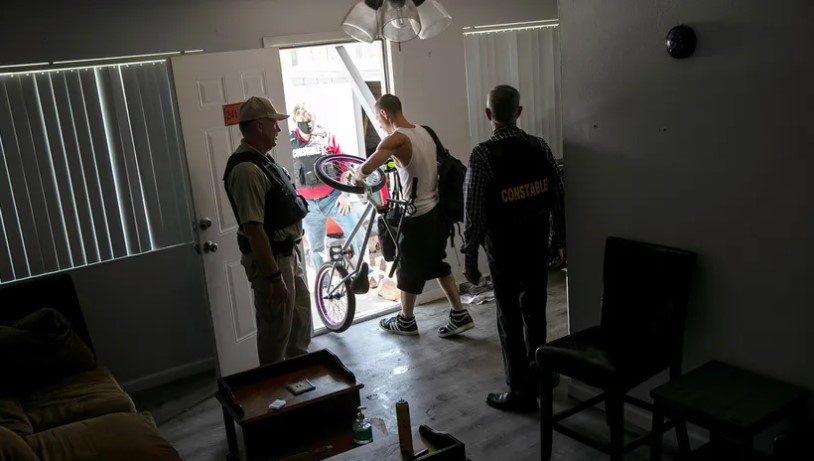Published by REALTOR.com | February 19, 2024
Stories of squatters taking over vacant properties, costing homeowners thousands to evict, are becoming shockingly common today.
Atlanta attorney David Metzger recently got a call from a client in a tricky situation: She’d gotten engaged, moved in with her fiancé, and decided to rent out her house in Dekalb County.
The day her home was listed, moving trucks arrived and a woman moved in with two kids, one a baby.
The problem? The house had not yet been rented out.
Metzger’s client, who’d heard about the moving trucks from her former neighbor, had her property manager call the police. When they stopped by to check out the situation, the “renter” presented them with a fake lease, with a fake electronic signature.
Presuming this “lease” was legit, the police left.
Metzger and his client spent three months legally wrangling before they were able to remove the squatter in February 2024 (which he says was a relatively short amount of time).
Yet although the mother was removed by the sheriff’s department, Metzger is not aware of any criminal charges brought against her. In another case, he says that his client’s squatters were given 15 minutes to remove all their belongings and then allowed to drive off in their car.
Such stories—of squatters taking over vacant properties, costing homeowners thousands to evict—are becoming shockingly common today.
“This is a real problem,” says Metzger, an attorney at Williams Teusink. “It’s not getting the attention it deserves.”
Why squatting is on the rise
When Metzger began practicing in 2011, squatter cases were “very rare.” But starting in 2023, there has been an “explosion” of them.
“People came out of COVID lockdowns to find out rents were no longer $800 a month, but $1,800,” he says. “They’d say, ‘I can’t handle that.’”
Metzger adds that while squatting used to exist mostly in low-end properties and neighborhoods, he is now seeing it in “bigger, fancier” properties, including in new construction.
According to the National Rental Home Council, there are at least 1,200 properties currently occupied by squatters in the Atlanta area.
How to get rid of squatters
To get squatters out of a property, Metzger uses a little-known Georgia state “intruder removal” statute that predates the Civil War.
“Most people don’t know about it,” he says. Under this statute, the property owner can execute an affidavit setting forth that the squatter is, in fact, an illegal intruder. Unless the squatter has a counter affidavit, this gives the sheriff’s office the right to remove the squatter.
But it’s not always that easy. How a sheriff’s office responds to a squatter case can vary greatly by county. And squatters are geniuses at finding legal loopholes and how to drag out the process. Typical eviction methods can take a year or longer. Meanwhile, the property owner is on the hook for loss of income and legal bills.
The best way to not have to deal with a squatter is prevention.


